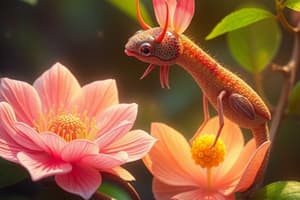Podcast
Questions and Answers
In the process of fertilization in animals, what is the role of the sperm?
In the process of fertilization in animals, what is the role of the sperm?
- To provide nutrients for the developing embryo.
- To fuse with the egg and contribute genetic material. (correct)
- To carry the female genetic material.
- To protect the egg from external harm.
External fertilization always results in a higher survival rate of offspring compared to internal fertilization.
External fertilization always results in a higher survival rate of offspring compared to internal fertilization.
False (B)
What is the key difference between sexual and asexual reproduction in terms of genetic variation?
What is the key difference between sexual and asexual reproduction in terms of genetic variation?
Sexual reproduction involves genetic variation, whereas asexual reproduction does not.
The process by which a tadpole transforms into a frog is called ______.
The process by which a tadpole transforms into a frog is called ______.
Match the following terms related to reproduction with their descriptions:
Match the following terms related to reproduction with their descriptions:
Flashcards
What is Reproduction?
What is Reproduction?
The production of offspring by sexual or asexual processes.
What is Asexual Reproduction?
What is Asexual Reproduction?
Reproduction involving one parent.
What is Sexual Reproduction?
What is Sexual Reproduction?
Reproduction involving two parents.
What is Budding?
What is Budding?
Signup and view all the flashcards
What is Fertilization?
What is Fertilization?
Signup and view all the flashcards
Study Notes
- Reproduction is a vital process for the continuation of species
- It involves creating new individuals from existing ones
Modes of Reproduction
- There are two primary modes: sexual and asexual reproduction
Sexual Reproduction
- Requires two parents: a male and a female
- Fusion of gametes (sex cells) occurs
- Offspring inherit traits from both parents
Asexual Reproduction
- Involves only one parent
- No fusion of gametes
- Offspring are genetically identical to the parent
Sexual Reproduction in Animals
- Involves the fusion of male and female gametes to form a zygote
Male Reproductive System
- Consists of testes, vas deferens, and penis
- Testes produce sperm (male gametes)
- Sperm are motile and much smaller than the egg
Female Reproductive System
- Includes ovaries, fallopian tubes (oviducts), and uterus
- Ovaries produce ova (eggs or female gametes)
- Uterus is where the development of the baby occurs
Fertilization
- The process of fusion of a sperm and an ovum
- Results in the formation of a zygote
- Two types of fertilization: internal and external
Internal Fertilization
- Occurs inside the female body
- Example: humans, cows, dogs, hens
External Fertilization
- Occurs outside the female body, usually in water
- Example: frogs, fish
Development of the Zygote
- The zygote divides repeatedly to form an embryo
- The embryo implants in the uterus wall
- Gradually develops into a fetus
Viviparous Animals
- Animals that give birth to young ones
- Example: humans, cows, dogs
Oviparous Animals
- Animals that lay eggs
- The eggs hatch and the young ones emerge
- Example: hens, frogs, lizards
Asexual Reproduction in Animals
- A single parent produces offspring
- Offspring are identical to the parent
- Common in simple organisms
Types of Asexual Reproduction
- Budding
- Binary Fission
Budding
- A new organism develops from an outgrowth or bud on the parent's body
- Example: Hydra
Binary Fission
- The parent cell divides into two equal halves
- Each half develops into a new individual
- Example: Amoeba
Metamorphosis
- A drastic transformation from the larval stage to the adult stage
- Example: frog and butterfly
Life Cycle of a Frog
- Egg → Tadpole → Adult Frog
- Tadpole is the larva of a frog
- It undergoes metamorphosis to become an adult frog
Life Cycle of a Butterfly
- Egg → Larva (caterpillar) → Pupa (chrysalis) → Adult Butterfly
- The caterpillar feeds and grows
- It then forms a pupa, inside which metamorphosis occurs
- Finally, the adult butterfly emerges
Studying That Suits You
Use AI to generate personalized quizzes and flashcards to suit your learning preferences.




